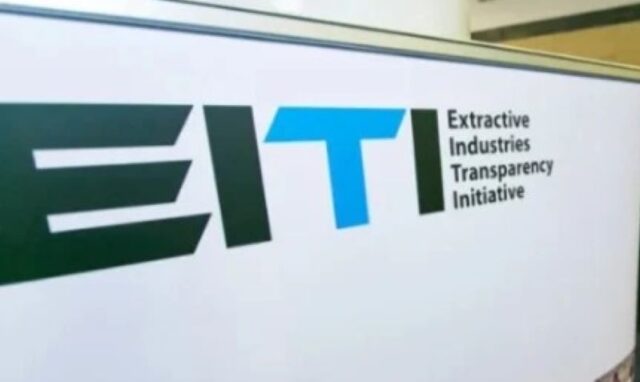…According to EITI, since its last Validation, Nigeria has maintained its practice of annual disclosures of data on oil and gas, solid minerals and subnational transfers to state governments.
MON APRIL 15 2024-theGBJournal| Extractive Industries Transparency Initiative (EITI) today publised its 2023 EITI Progress Report in which the EITI Board concluded that Nigeria has achieved a moderate overall score (72 points) in EITI implementation.
The EITI Board said that Nigeria has maintained its extensive EITI reporting and gradually strengthened its systematic disclosures, noting that While EITI data plays a key role in informing national debate on key topics, more attention is needed on multi-stakeholder oversight of extractive industry governance.
The report observed Nigeria’s economy high dependance on the extractive sector, with oil and gas accounting for 7.2% of GDP, 41% of government revenues and over 75% of exports in 2021.
Traditionally Africa’s largest oil producer, Nigeria has struggled to meet its Organization of Petroleum Exporting Countries (OPEC) quota, averaging around 1.3 million barrels per day of production in 2022-2023.
The landmark 2021 Petroleum Industry Act (PIA), a regulatory framework for Nigeria’s oil and gas sector, is currently being rolled out and is expected to catalyse greater investment in Nigeria’s upstream petroleum sector. The country also has a small mining sector, dominated by artisanal and small-scale mining and quarrying.
According to EITI, since its last Validation, Nigeria has maintained its practice of annual disclosures of data on oil and gas, solid minerals and subnational transfers to state governments.
”It has also made gradual progress in strengthening systematic disclosures by government entities such as the new Nigerian Upstream Regulatory Commission (NUPRC) and the Nigerian National Petroleum Company Ltd (NNPC).
Nigeria, through NEITI and the Corporate Affairs Commission (CAC), has been a continental leader on beneficial ownership disclosures, through launching a beneficial ownership register and using beneficial ownership data in the government’s assessments of oil, gas and mining license applications.”
“I commend Nigerian stakeholders for their efforts to increase systematic disclosures of data through the EITI,” said Helen Clark, EITI Board Chair.
“This Validation should provide an impetus for NEITI to focus on proactive analysis and advocacy leveraging EITI data, and for the Federal Government to ensure that transparency and accountability is a hallmark of Nigeria’s EITI process. The EITI Board will continue to monitor adherence to the EITI Code of Conduct and adherence to all provisions of the EITI’s civil society protocol.”
Institutionalising transparency gains
Extensive systematic disclosures of data are reported by federal government agencies, the national oil company NNPC, and select extractive companies operating in jurisdictions that mandate reporting of country-by-country payments to governments (Canada, the EU, Norway and the UK).
NNPC’s monthly disclosures of cargo-level domestic and export sales of crude oil and natural gas, available in open format, serve as a notable example of good practice in systematically disclosing production data and the state’s in-kind oil and gas revenues.
NNPC started publishing its audited financial statements in 2019. Furthermore, the Budget Office systematically discloses aggregate government revenues from the oil and gas sector in its quarterly and annual budget implementation reports. NEITI disclosures are subject to extensive debate in Parliament and among the public.
The PIA Implementation Steering Committee, on which NEITI sits, presents an opportunity to integrate transparency requirements into new PIA implementing regulations. Moreover, the government’s plans to submit revisions to the 2007 NEITI Act offer an opportunity to update NEITI’s internal governance mechanisms, ensuring a more concrete integration of transparency and accountability into government systems.
Improving NEITI’s governance
Realising these opportunities will require resolving governance challenges within NEITI and fostering an environment conducive to engaging all constituencies in the EITI process, particularly civil society.
EITI said this Validation has raised serious concerns, including a 17-month delay in reconstituting the NEITI National Stakeholder Working Group (NSWG) during the COVID-19 pandemic, and public concerns over NEITI’s unprecedentedly large recruitment of new secretariat staff.
Incidents of state security services harassing civil society activists involved in the EITI process have heightened divisions within civil society. Swift action is required to address these challenges and follow up on corrective actions related to stakeholder engagement to strengthen NEITI’s impact on extractive industry governance in Nigeria.
In a sector that is vulnerable to integrity and governance risks, NEITI’s contribution to public debate has been significant.
By returning to its previous practices of issuing regular policy briefs and position papers, the EITI in Nigeria can leverage its role to strengthen transparency and accountability in extractive industry governance.
There remain opportunities to capitalise on more than 20 years of EITI disclosures to develop analysis and policy recommendations as Nigeria faces a critical juncture in the development of its extractive sector.
X-@theGBJournal|Facebook-the Government and Business Journal|email:gbj@govbusinessjournal.com|govandbusinessj@gmail.com










